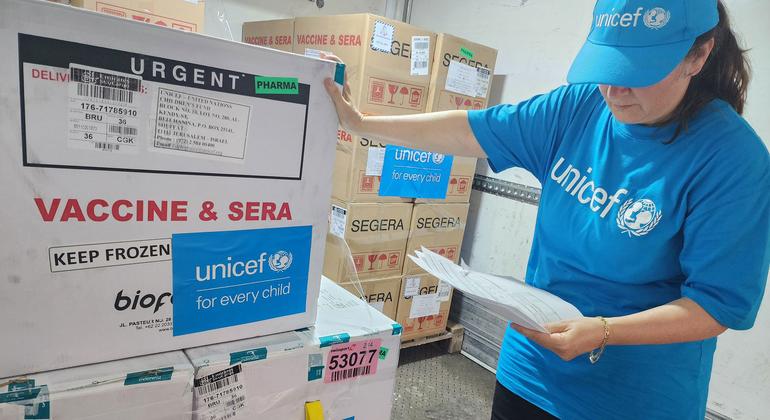UN affirms safety and effectiveness of polio vaccine in Gaza


The harsh conditions of war have caused the disease to resurface after more than two decades. Last week, a case was confirmed in a 10-month-old child.
Fighting vaccine misinformation
At a daily press briefing in New York on Tuesday, UN spokesman Stéphane Dujarric noted that there has been misinformation surrounding the vaccine.
“I want to be clear: the safest and most effective way to protect children from polio virus, regardless of the variant, is to vaccinate them,” he said. speak.
Several news stories have appeared online in Israel and the United States, quoting two Israeli scientists making false claims that the polio vaccine set to be used in Gaza is “experimental” and poses a danger to people in both Palestine and Israel.
United Nations Children’s Fund (UNICEF), World Health Organization (WHO) and the United Nations agency assisting Palestinian refugees, UNRWAis preparing to launch the campaign, which will be conducted in two rounds.
More than 640,000 children under 10 years of age will be given two drops of oral polio vaccine type 2.
“This vaccine is safe, effective and provides first-class protection,” said Dujarric. “It is the vaccine recommended globally by the World Health Organization to prevent type two poliovirus outbreaks.”
The vaccine was rolled out in March 2021 and since then more than 1.2 billion doses have been administered to protect children in more than 40 countries, he said.
United Nations Secretary-General António Guterres recently call for humanitarian pause to allow for widespread vaccination campaigns.
Gaza had high vaccination rates before conflict escalated last October, but routine vaccination rates have dropped, increasing the risk of vaccine-preventable diseases for children, including polio.
Israeli evacuation order is latest threat to Gaza aid workers
Meanwhile, an evacuation order issued by the Israeli military has affected the safety of humanitarian workers delivering aid in the Gaza Strip, the head of the United Nations Department of Safety and Security (UNDSS) said on Tuesday.
“The mass evacuation orders are the latest in a long list of intolerable threats to United Nations staff and humanitarian workers,” Deputy Secretary-General Gilles Michaud said in a statement.
Mr Michaud stressed the UN’s determination to remain in Gaza, where lifesaving aid is still being distributed, which he called “a huge feat when we are operating on the highest periphery at acceptable risk”.
Out of safe space
The Israel Defense Forces (IDF) only gave the United Nations a few hours’ notice over the weekend to move more than 200 personnel out of their offices and residences in Deir Al-Balah, a key humanitarian hub, he said.
“Like most Palestinians in Gaza, we are running out of safe space for our staff.“, he said.
Furthermore, he added that “the timing could hardly be worse” as UN agencies prepare to begin a mass polio vaccination campaign next week, requiring large numbers of staff to enter the region.
Stuck in the crosshairs
“However, the IDF’s actions this weekend exacerbate existing security threats and severely impact the speed at which we can safely operate. These limitations are beyond our control,” he continued.
Mr Michaud said “humanitarian organisations have been in the crosshairs” throughout the Gaza crisis – the deadliest the UN has ever recorded.
“Under international humanitarian law, our ability to provide assistance depends on the responsibility of the parties to the conflict to do everything in their power to keep our colleagues safe,” he said.
Stressing that “the women and men who risk their lives to deliver humanitarian aid need a safe and stable workplace,” he called on all parties to “respect international law and their commitments under it.” United Nations Charter to ensure the safety and security of United Nations personnel and facilities.”




